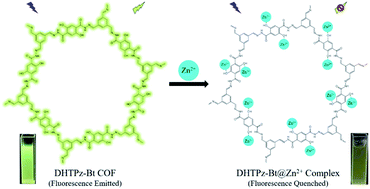Application of a novel hydroxyl functionalized fluorescent covalent organic framework for turn-off ultrasensitive Zn2+ ion detection†
Abstract
In this research, a novel hydroxyl functionalized covalent organic framework (COF) with fluorescence properties was rationally designed based on the reaction between 2,5-dihydroxy-terephthalic-dihydrazide (DHTPz) and 1,3,5-benzenetricarboxaldehyde (Bt) for Zn2+ detection. The prepared DHTPz–Bt exhibited strong fluorescence, while the apparent quenching of fluorescence was observed after the introduction of Zn2+. Meanwhile, DHTPz–Bt exhibited high sensitivity and promising selectivity during the detection of Zn2+. Additionally, the recognition process was revealed to be attributed to the coordination between the hydroxyl groups on the phenyls of DHTPz–Bt and Zn2+ ions, as verified by using Fourier-transform infrared spectra and X-ray photoelectron spectra. This work demonstrates the great potential of fluorescent probes by rationally introducing metal ligands, which will lead to a suite of new COF materials for metal ion sensing in a practical manner.



 Please wait while we load your content...
Please wait while we load your content...